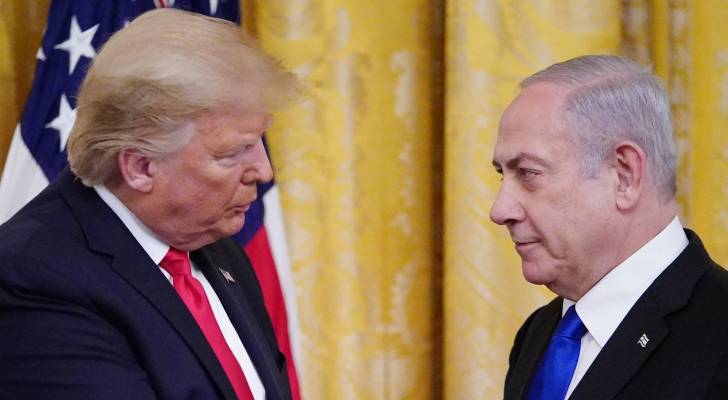Donald Trump (left) and Benjamin Netanyahu (right) (Credit: AFP)
Tensions rise as Netanyahu pushes for Iran strike while Trump seeks nuclear deal
As the Trump administration edges closer to a potential agreement with Iran over its nuclear ambitions, sharp disagreements between Washington and Tel Aviv have begun to surface, with "Israeli" Prime Minister Benjamin Netanyahu threatening unilateral military action, the New York Times (NYT) reported.
According to multiple officials familiar with recent discussions, Netanyahu has expressed mounting frustration with the pace and direction of talks aimed at curbing Iran's nuclear program. He has reportedly warned US officials that "Israel" is prepared to strike Iran’s key nuclear enrichment facilities, regardless of American participation or approval.
This growing rift has already resulted in at least one tense phone call between President Donald Trump and Netanyahu, as well as a series of meetings involving top American and "Israeli" officials. The core of the disagreement lies in differing approaches: Trump is pursuing a negotiated end to Iran’s nuclear program, while Netanyahu insists that only military force will ensure Tehran is stopped.
Trump told reporters Sunday that “There could be something good” in the coming days, hinting at progress in the talks. But those close to the negotiations say any announcement is likely to be a broad statement of shared goals rather than a binding deal. Crucial issues—including whether Iran can enrich uranium domestically and what to do with its existing stockpile—remain unresolved.
"Israeli" officials are skeptical that Trump’s push for a deal, which he hopes to frame as stronger than the 2015 accord reached under the Obama administration, will achieve meaningful curbs on Iran’s program. Netanyahu, for his part, has long maintained that Iran’s nuclear infrastructure must be completely dismantled. "The only good deal," he said last month, "would be one that dismantles all of the infrastructure.”
"Israel", which is not a party to the US-Iran talks, has taken steps that could make military action more feasible. In October, Israeli Occupation Forces (IOF) reportedly disabled critical elements of Iran’s air defense systems, a move seen as clearing the way for possible airstrikes.
Behind the scenes, "Israeli" Strategic Affairs Minister Ron Dermer and Mossad chief David Barnea have held a series of meetings with Trump’s lead negotiator Steve Witkoff, including a session in Rome and follow-ups in Washington. They also met with CIA Director John Ratcliffe.
The White House declined to elaborate on the meetings, referring instead to Trump’s weekend remarks that he would “love to see no bombs dropped.”
A sticking point in the negotiations is Washington’s demand for Iran to halt all enrichment of nuclear materials within its borders. Iran’s chief negotiator Abbas Araghchi has rejected this outright. “If the Western powers insist on ‘zero enrichment’ in Iran,” he posted on social media Tuesday, “then there is nothing left for us to discuss on the nuclear issue.”
In an attempt to salvage the talks, Witkoff and Omani mediators have floated ideas such as a regional consortium—including Iran, Saudi Arabia, and other Arab states—to produce fuel for civilian nuclear energy. However, where enrichment would take place remains unresolved.
Witkoff is also now open to an interim framework that would outline basic principles for a future agreement. Such a move mirrors the approach taken by the Obama administration in 2013, which led to the 2015 accord after two years of negotiations. Trump campaigned against that deal in 2016, calling it a “disaster,” and withdrew from it in 2018, reimposing sanctions on Iran.
Since then, Iran has expanded its nuclear efforts. US intelligence assessments indicate that Iran now possesses uranium enriched to 60 percent purity—dangerously close to weapons-grade—and could reach full bomb-making capability within weeks.
Last month, Ratcliffe traveled to "Israel" to discuss possible covert actions against Iran, signaling ongoing intelligence coordination. Historically, "Israel" and the US have collaborated on secret operations targeting Iranian nuclear infrastructure, including cyberattacks.
Netanyahu, a longstanding critic of diplomacy with Tehran, has previously derailed similar efforts. In 2015, he made a high-profile speech before the US Congress to oppose the Obama-era deal.
Now, "Israeli" officials are again threatening military action—even without American backing. They have conveyed to the Trump administration that they may act unilaterally, and US intelligence has detected preparations consistent with a potential strike.
During a phone call, Trump reportedly confronted Netanyahu about these plans. The "Israeli" leader did not deny the military preparations and argued that Iran’s current vulnerability presents a fleeting opportunity.
American defense officials remain wary of the effectiveness of an "Israeli" operation without US support. But some "Israeli" officials believe that if Iran retaliates, the US will be drawn in regardless.
Even if a deal is reached, "Israeli" officials warn that Netanyahu may still proceed with a strike. After meeting with Trump in April, he instructed his national security team to continue planning for military options—ranging from limited strikes to multi-day bombardments across Iran, including sites in densely populated cities.
With Trump’s deadline for a deal fast approaching and negotiations still stuck on critical issues like uranium enrichment, US officials are weighing the possibility of a temporary agreement to delay "Israeli" action. Such a deal would likely require Iran to export or dilute its most sensitive nuclear materials—giving Trump a chance to claim a diplomatic win, while calming immediate fears of war.
Still, concern lingers in Washington that "Israel" could act with little notice. US intelligence estimates suggest a strike could be launched within hours of a final decision—leaving little time to intervene.




